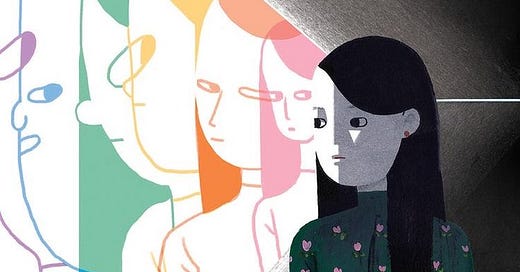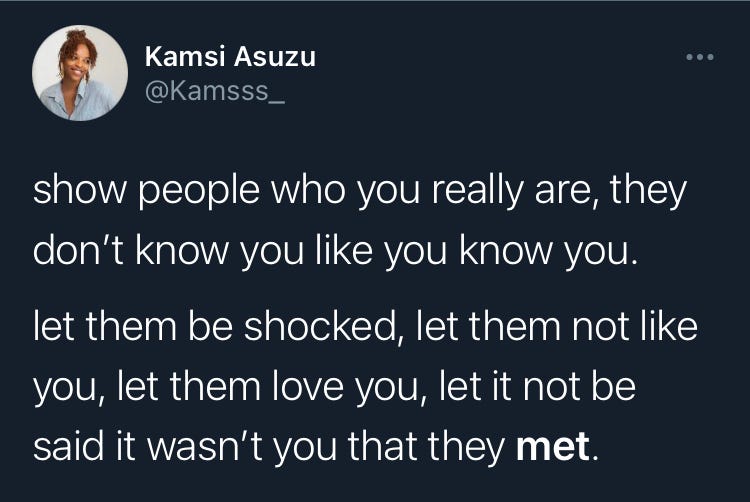I’ve never truly understood the idea of being self-made, I do not have the luxury to. When I smile sometimes, I see the faces of my family members, near and far. In high school, I walked and talked like every new person I admired. When I am drowning in self-pity, I recall the many kindnesses I’ve received from friends and strangers alike. I am a composite creature made of the contributions of the thousand different people I’ve encountered in my life’s journey. I hold the view that anyone who claims to be self-made either lacks introspection or has never known love.
I first learned about mimesis in Andre Rabe’s ‘Desire Found Me’, a book that explores René Girard's theory of Memetic Realism in relation to the atonement of Christ. Mimesis is essentially imitation, or mimicry - the act of resembling. Philosophers, from the ancients (Plato, Aristotle, etc.), to the moderns (Coleridge, Taussig, etc), theorised about the idea of mimesis in some way or another. Artists mimic nature and humans mimic one another. In the latter, this either leads to conflict - with the self and with the other - or to understanding. When I discover mimicry in my behaviour, I choose to lean towards understanding.
“I am found in a web of relationships, a node within a network created by interactions with others and my world. I am formed in a flow of desires and intentions, inseparably woven into this world. My story is part of a much larger story and despite feelings of autonomy and ideals of individual freedom, I am not myself by myself. I am more than myself. I am a reflection... and a reflection needs a reference beyond itself to be whole.”
- Andre Rabe in Desire Found Me
At my birthday party recently, my friends took turns to share their favourite things about me. This exercise was both painful (because having that much attention directed at me made me feel overly self-conscious) and beautiful (it feels incredibly good to seen through kind lens). It was positively revelatory and the most important realisation, which I also shared with them, was that the virtuous traits I possess are traits I’d mirrored from each one of them and from others not present.
In Moana (my favourite Disney movie for its strong themes of self and cultural identity), Moana’s grandmother teaches her (through a song, “I am Moana”) how to find oneself and one’s path in life through self understanding and listening to “the quiet voice still inside you”. My favourite line from that song informed the title of this post because I have found it to be true - “the people you love will change you”.
The first set of people to imprint on a person’s identity and behavioural patterns are their primary care givers. As the little human grows and meets more people, they acquire more traits, for better or for worse. And the people who most impact a person’s life are the people closest to the person - the loves of a person’s life. And these loves come in all forms - familial, platonic, romantic, spiritual, societal, etc. Could be love, could be the lack of, but the price of existing in community is change, for better or for worse. To resist this kind of change is to be at odds with everything and everyone.
If the people closest to me are one of the biggest determinants of who I am or become, it makes sense that I choose who gets to be closest to me. I’ve never been one for superficial friendships and I think that a question afore one’s mind when making friends or lovers should be, “in what ways am I willing to be changed by this person” or more simply, “What trait, possessed by this person, do I hope to imbibe?”
Pre-determining the inevitable, as much as is within our power, is one of the best ways to achieve our preferred outcomes. Whenever I’m looking to strengthen a virtue in myself, I subconsciously inch closer to someone who strongly embodies that virtue. To be fair, it hasn’t been that calculated in real life, only in retrospect do the dots connect. There is a stroke of luck here too in that I have been incredibly blessed with great friends. To love is: to be open; to be changed; and to change others.
This is not about adaption (changing to keep someone interested) or erasure - (losing yourself for acceptance). It is allowing yourself to show up as yourself and allowing yourself to refine and be refined by others into something more beautiful. This kind of beautiful, impactful exchange is only made possible when one is secure in oneself, a security that comes with self understanding and self acceptance.
Self acceptance has become a recurring theme in my writing because I’ve found it to be liberating. In friendships, it helps me to show up as myself, virtues and flaws. It is in this honest showing up that I can be truly accepted. It is also in this honest showing up that my virtues are strengthened, and my flaws are exposed and corrected. “Love your neighbour as yourself” is, beyond a spiritual instruction, a declaration of a primal truth that one can only love others to the extent that they have loved themselves. nemo dat quod non habet.
When you stop being at war with yourself, you find that you have more space for love and connection. Yet, committing to the journey of self understanding and acceptance is no reason to isolate. Even that road is best travelled with the love of others.
“rarely, if ever, are any of us healed in isolation. healing is an act of communion.
- bell hooks in ‘all about love’
Change in life is inevitable, with love or without, and yet, the terms of sacred communion is to be open to change. Would we rather not be changed by love?






“Change in life is inevitable, with love or without, and yet, the terms of sacred communion is to be open to change. Would we rather not be changed by love?”
this was really interesting to read, felt like a warm hug (i can't explain this). thank you.
I exhaled after reading this. It’s just beautiful and profound.